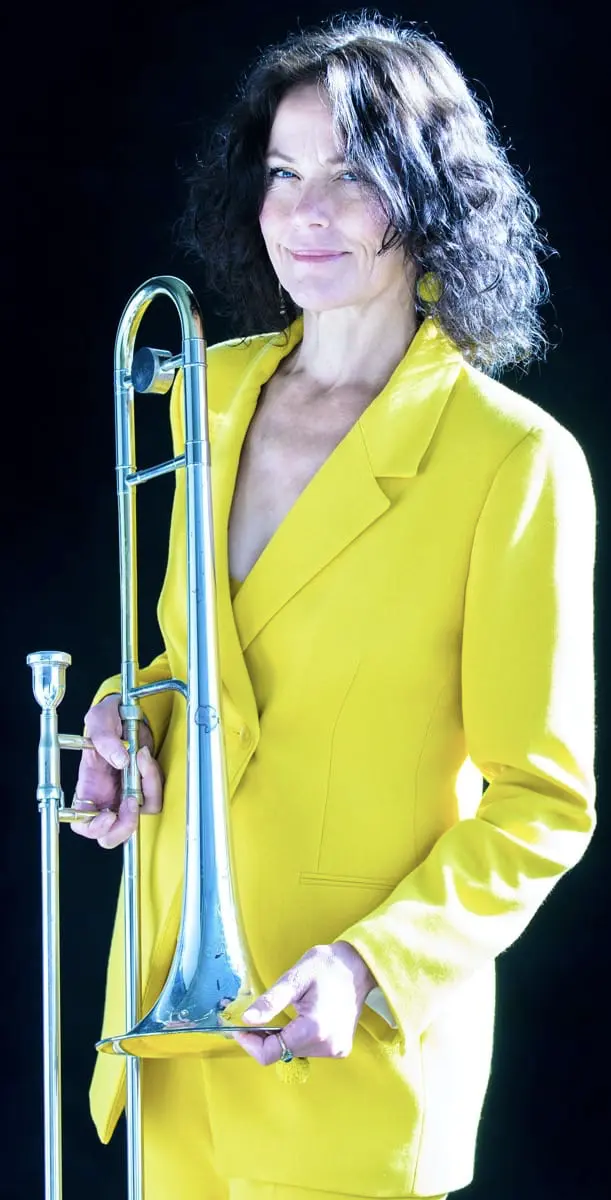The intimate yet steeply raked and magnificent Turner Sims Concert Hall at the Highfield Campus of the University of Southampton celebrates its 50th anniversary this year, with a typically wide-ranging and high-quality programme of classical and jazz, folk and genre-mixing “world” music.
As part of the programme one of Denmark’s finest contemporary musicians, the slide-trombonist and composer Lis Wessberg, appeared with her Danish quartet at the hall, following a well-received night at London’s Pizza Express. Both concerts, which featured original material by Wessberg, were part of the Sounds of Denmark three-day festival which (at Pizza Express) also profiled pianists Carsten Dahl and Nicolaj Hess, plus the Aarhus-based Abekejser “jazztronics” electro-group and Estonian vocalist Karmen Röivassepp.
Wessberg was scheduled to appear leading the quartet which appears on both her Yellow Map (2021) and the forthcoming Twain Walking (with two tracks featuring Röivassepp), each released on Denmark’s excellent April Records. Wessberg’s husband, the adroitly inventive and tonally sensitive Steen Rasmussne (p, kyb, syn) was on stage as expected, likewise the finely focused, at times fiery drummer Jeppe Gram. But, most unfortunately, the quartet’s regular bassist Lennart Ginman was indisposed. However, Ginman’s compatriot Jesper Thorn did a great job depping. He provided an assured range of spaciously turned pizzicato and arco lines, as scrupulously rendered as they were potent and with the arco figures featuring an arresting, strongly building and atmospheric use of loops on The Ancient Road, from Yellow Map, and Ripples, from Twain Walking.
I’ve been aware of Wessberg for some time now. She’s appeared on over 50 albums, led by the likes of, e.g., Brazilian singer Joyce Moreno, Fredrik Lundin, Randy Brecker, Kid Creole and The Coconuts and the Ernie Wilkins Almost Big Band. And she has long been a regular member of percussionist Marilyn Mazur’s all-female Shamania ensemble. Hear her, for example, on Shamania, the 10-piece session for RareNoise Records which I reviewed in 2019.
Mazur appears on one track, Sister M, of Wessberg’s Yellow Map – the trombonist’s debut release as a leader and with that track marking, as far as I am aware, the last time to date that she has used a plunger mute. The album has the sort of soulful and melodic, song-like and poetically infused music which leaves one keen to hear more. And the subsequent Twain Walking (to be released this April) does not disappoint. So it was a no-brainer to decide to go down to Southampton and check out Wessberg and her cohorts live.
Wessberg was born in 1967 and is a graduate of Copenhagen’s Rhythmic Music Conservatory. Her influences and elective affinities run far and wide. She is an omnivorous reader – the title track of Twain Walking was inspired by a Robert Frost piece – and you can sense a fructifying affinity for blues and gospel deep down in her overall inwardness of poetic intent and expression. And if Wessberg has a special feeling for the work of Curtis Fuller on Coltrane’s classic Blue Train from 1957, and loves equally Miles Davis and Palle Mikkelborg, Lee Konitz, Wayne Shorter and Joe Henderson, Johnny Hodges and Ben Webster, she (like others in her quartet) is also open to contemporary developments in the worlds of, e.g., Massive Attack, Radiohead and Portishead. Ambient moods and trip-hop grooves certainly played their part in the two-set Turner Sims concert.
To characterise the music overall: for me, it was in good part most memorable and mesmerising, in lesser part tending to the repetitive in its chiefly ballad-like mien. The quartet gelled well, with swing largely given over to a rhythmic impetus somewhere between a clipped and laid-back jazz-rock feel, now elegant, now a touch more forceful, and trip-hop. With the 350-capacity, high-ceilinged and brick-faced hall somewhat under a third full, the degree of overall amplification became an especially crucial factor and the first set was (again, for me) more than a touch too loud, with Thorn’s bass at times sounding more like an electric instrument than an amplified double bass. Fortunately, sound levels improved considerably in the second set.
Drawn from both Yellow Map and Twain Walking, the programme featured some of these albums’ most striking pieces, including Birds, Posterity and The Strip, the last a reflective yet rhythmically compelling piece Wessberg wrote in 2014 in response to the situation in Gaza. Tapestry Of Life featured some of the most chromatically and rhythmically vivid music of the evening, while the concluding Claus and Ripples epitomised the soulful rewards of Wessberg’s rigorous eschewing of any overt displays of technical virtuosity for its own sake. At the end of the concert, she even had the grace to apologise to the applauding audience for the fact that the band had not played very many uptempo numbers, because of her strong preference for a song-like ballad approach.
No need to apologise for a music of resonant poetic reach, Lis. But maybe the odd triplet-stoked swinger wouldn’t go amiss now and then, variety being – as the cliché rightly has it – the spice of life.
Lis Wessberg Quartet at the Turner Sims Concert Hall, University of Southampton, March 2024
















